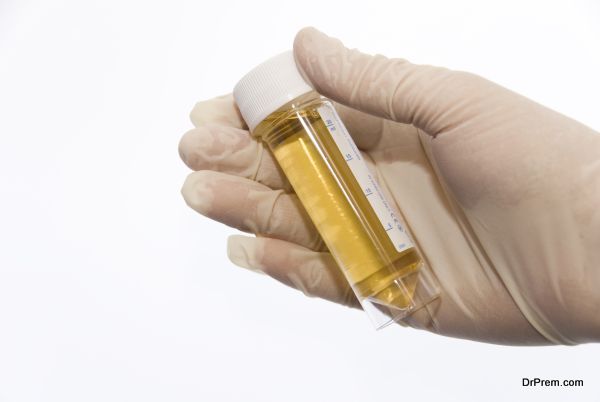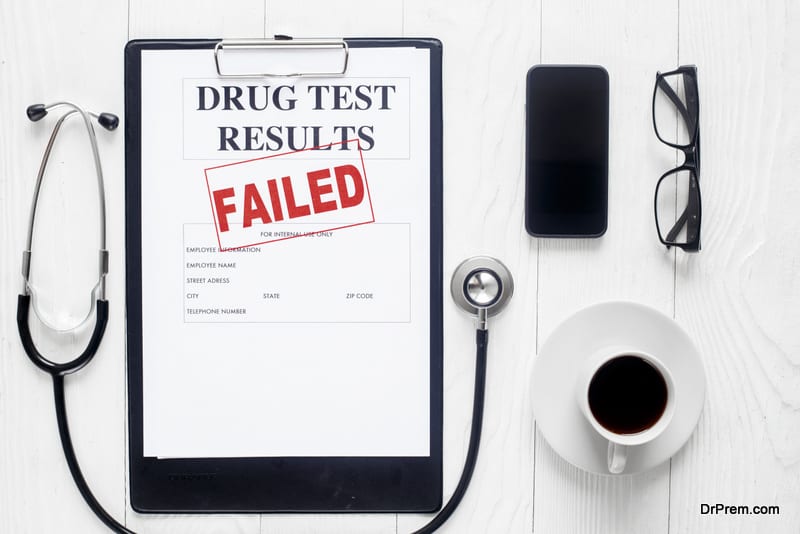You’ll take countless tests in your life. School exams, driving tests, blood tests, and IQ tests. One test that you may never have to take is a drug test. But now more than ever, employers and sports teams require participants to undergo drug tests. These are often done randomly in an attempt to uncover dishonest individuals. Whether or not you think you’ll be facing a drug test soon, here are a few things to keep in mind if that day ever comes.
1. Drinking Water Will Help You Pass a Drug Test
 The truth is, drinking an excessive amount of water will dilute your urine. But that doesn’t mean it will result in a negative drug test if there are narcotics in your system. To fully understand the process you must first understand what exactly they’re testing for. Most urine drug tests monitor the amount of creatinine in your urine. Creatinine is a compound produced by the metabolism of creatine and is purged in urine. Your body produces a natural level of creatinine. When you drink large amounts of fluid prior to your test, those natural levels are thrown off and the drug testers will notice it easily. Once they realize you’re potentially trying to dilute your specimen, chances are, they’ll run even more rigorous tests to obtain an accurate, untainted result. So the only thing you’re gaining from drinking tons of fluid before your drug test is hydration.
The truth is, drinking an excessive amount of water will dilute your urine. But that doesn’t mean it will result in a negative drug test if there are narcotics in your system. To fully understand the process you must first understand what exactly they’re testing for. Most urine drug tests monitor the amount of creatinine in your urine. Creatinine is a compound produced by the metabolism of creatine and is purged in urine. Your body produces a natural level of creatinine. When you drink large amounts of fluid prior to your test, those natural levels are thrown off and the drug testers will notice it easily. Once they realize you’re potentially trying to dilute your specimen, chances are, they’ll run even more rigorous tests to obtain an accurate, untainted result. So the only thing you’re gaining from drinking tons of fluid before your drug test is hydration.
2. Not all Drug Tests Use Urine
Drug testing goes far beyond a urine sample. Certain types of drug tests can identify different types of drugs in your system. Urine drug tests are most popular because they’re easy, convenient, and inexpensive to use. These are the main type of tests used by employers, parole officers, and sometimes, even parents monitoring their children’s behavior. The 10 panel drug test is popular among employers because of the extensive list of drugs it can identify. This website will tell you more about this type of test. But what other types of tests are there? Drugs can be detected through a hair sample, saliva, or blood. Saliva samples are noninvasive and easy for technicians to administer by simply swabbing the inner cheek. Hair samples are some of the most reliable because they are extremely difficult to tamper with. The only downside to these types of drug tests is that results can take up to 90 days. The results from urine drug tests are generally ready in less than 48 hours.
3. All Drugs Stay in Your System for the Same Amount of Time

There is a big difference when it comes to the type of drug a person has used and the duration for which it remains in their system. The dosage of the drug combined with how much prior to the exam you used the narcotic will all affect test results. But the type of drug isn’t the only factor. Every person’s internal make-up is different and will react to the drug differently. This means the same dosage of one drug can stay in one person’s system much longer than someone else’s. Factors that affect your body’s ability to absorb and purge illegal drugs include your metabolism, your tolerance, and other underlying medical conditions. Here is a short list of some of the most well-known narcotics and how long traces remain in your system.
- Marijuana/Cannabis – 2 weeks in blood and 7-30 days in urine
- Heroin – 12 hours in blood and 3-4 days in urine
- Cocaine – 1-2 days in blood and 3-4 days in urine
- Methadone – 2-3 days in blood and 3-4 days in urine
- LSD – 2-3 hours in blood and 1-3 days in urine
- Alcohol – 10-12 hours in blood and 3-5 days in urine
There is no guarantee to how long a drug will stay in your system, which is why you shouldn’t use illegal narcotics, especially if you’re faced with an upcoming drug test or your job allows for random testing.
4. Exercise Can Help or Hurt Your Chances of Passing a Drug Test
Some people believe that drinking excessive fluids will wash traces of drugs from your system. Others think that sweat from exercise can achieve the same goal. Both of these theories are inaccurate, although the beliefs surrounding exercise and detoxing may have some validity. That’s because your body metabolizes drugs and alcohol the same way it does food, water, and legal medications that you ingest. If you have a faster metabolism, your body may purge drugs faster than someone with a slower metabolism. Exercise speeds up metabolism and may increase the rate at which your body burns through drugs in your system. However, depending on how the metabolites in your body attach to fat cells, exercise may actually increase your chances of failing a drug test.
5. Drug Tests are Determined by a Single Factor
 There’s no one size fits all when it comes to drug tests. Many factors go into a positive or negative screening. The first factor is the type of drug it is. As we’ve learned, certain drugs stay in a person’s system longer than others. Drugs stay in a person’s urine for approximately a week. Hair follicles can hold onto drug traces for months after use. Next is the dosage or amount of drugs a person ingested. The more drugs a person uses, the longer it stays in their system. Another key factor is the frequency with which a person uses drugs. One time use will metabolize faster than drugs used over an extended period of time. People who use illegal drugs daily may fail a drug test months later due to the amount of narcotics in their system.
There’s no one size fits all when it comes to drug tests. Many factors go into a positive or negative screening. The first factor is the type of drug it is. As we’ve learned, certain drugs stay in a person’s system longer than others. Drugs stay in a person’s urine for approximately a week. Hair follicles can hold onto drug traces for months after use. Next is the dosage or amount of drugs a person ingested. The more drugs a person uses, the longer it stays in their system. Another key factor is the frequency with which a person uses drugs. One time use will metabolize faster than drugs used over an extended period of time. People who use illegal drugs daily may fail a drug test months later due to the amount of narcotics in their system.
Using illegal drugs is detrimental to your health and can cause irreversible damage or even death. Steering clear of them is in your best interest for a long list of reasons. This is why many employers use drug tests to monitor their staff’s activity and ensure a safe, healthy work environment.
Article Submitted By Community Writer




